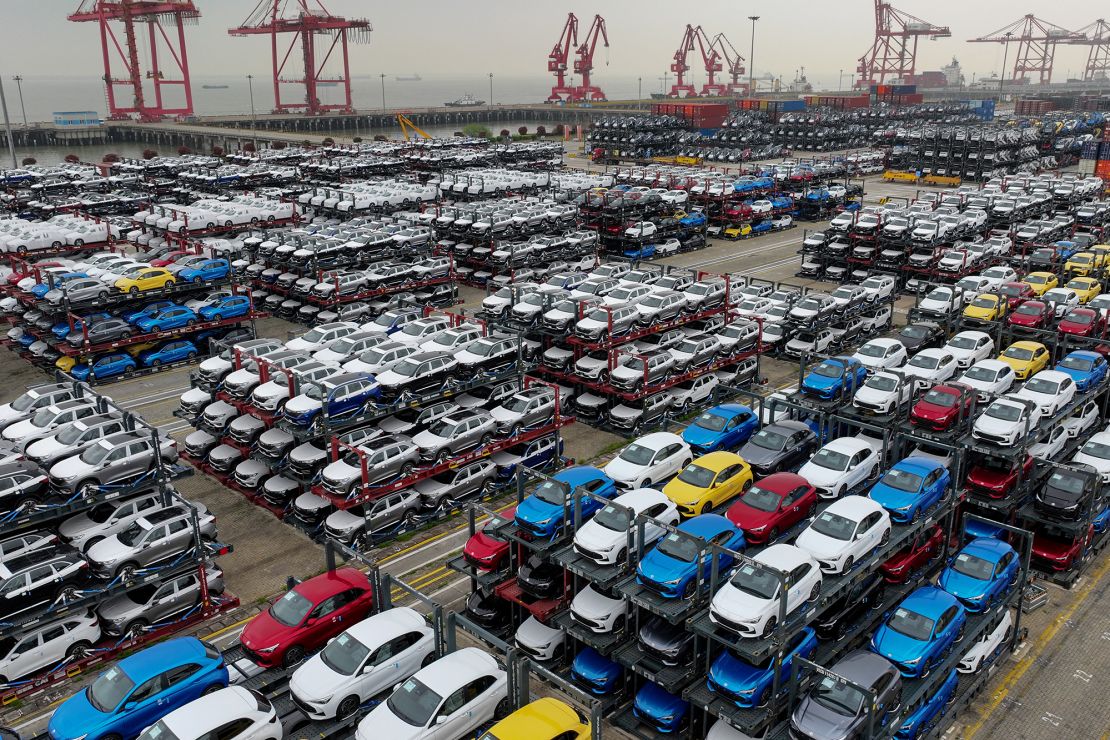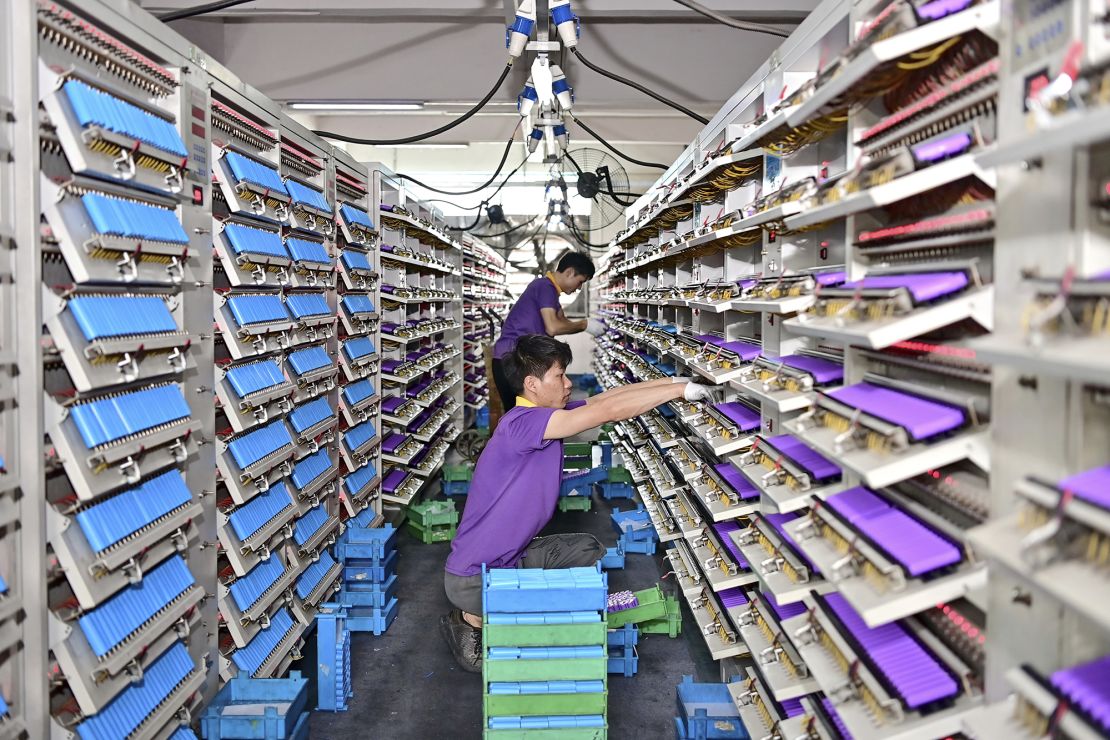The United States and Europe are racing to narrow China’s commanding lead in clean energy technologies, throwing subsidies at local manufacturers and hiking tariffs on Chinese imports in a strikingly protectionist turn.
China’s dominance in clean energy supply chains presents a conundrum for governments trying to green their economies and meet fast-approaching climate targets while protecting entire industries and thousands of jobs from a flood of cheap imports.
Without China’s electric vehicles (EVs), solar panels, wind turbines, and batteries, reducing planet-heating pollution could take longer and ultimately increase costs for businesses and consumers.
But the West needs to avoid repeating Europe’s mistake of becoming overdependent on a single supplier — Russia — for cheap gas and wants the economic rewards that come from developing its own technologies of the future.
“We saw the playbook for how China came to dominate the solar panel industry… granting massive subsidies for domestic suppliers, while… closing the domestic market to foreign businesses,” the European Union’s competition chief Margrethe Vestager said in April as she announced a probe into Chinese wind turbine makers. “The result is that nowadays less than 3% of the solar panels installed in the EU are produced in Europe.”
“We can’t afford to see what happened on solar panels happening again on electric vehicles, wind, or essential chips,” she added.
Rising global competition in green technologies is increasing tensions between China — the world’s biggest manufacturer — and its major trading partners. The US and the EU have adopted a tough stance on imports from China, with Washington hiking tariffs not just on the country’s EVs, but also batteries, solar panels, and critical minerals.
“The competition for position in the clean energy economy is fierce, because it is not necessarily only about climate change concerns,” Fatih Birol, the CEO of the International Energy Agency (IEA), told reporters on a recent call.
“It is driven by industrial policy concerns: who will get what kind of position in the next chapter of industrial technology.”
For now, China is leading the race. Last year, the country accounted for three-quarters of global investment into clean technology manufacturing, although that’s down from 85% in 2022, according to the IEA.
This year, it is on track to invest $676 billion in clean energy overall amid robust demand for solar panels, lithium batteries and EVs. That’s more than double the US’s projected $315 billion investment and way ahead of the EU’s $370 billion.
Those huge investments have turned China into the world’s biggest and lowest-cost supplier of many of the technologies and critical minerals needed for the clean energy transition.
According to the IEA, Chinese carmakers produced more than half of all electric cars sold worldwide last year. Global manufacturing capacity for EV and industrial-use batteries, wind turbines, and solar panels is also concentrated in China.
A similar picture emerges when it comes to the critical minerals essential for EVs and other green technologies. Over half of global processing of lithium and cobalt takes place in China, as does almost all refining of graphite, used in EVs, and of rare earths, crucial for generators on wind turbines.
Beijing’s virtual monopoly on the processing of some critical minerals comes with particular risks for the global green transition. Last year, China slapped export controls on gallium and germanium — rare earths essential for manufacturing semiconductors — in response to restrictions by the US, the Netherlands, and Japan on the exports of some semiconductor equipment to China.
Beijing also later tightened its grip on the supply of graphite, used in EVs.
The world’s second-biggest economy has made no secret of the fact that it wants to export more of the country’s “new trio” of products — namely, EVs, lithium batteries, and solar panels.
But announcing substantial increases in tariffs on EVs from China in June, the EU’s executive body said: “The EU’s green transition cannot be based on unfair (subsidized) imports at the expense of EU industry.”
While tariffs may protect local manufacturers, experts say they could harm the shift to green energy, as well as increase costs for businesses.

“There is no question that the world has become too dependent on China, especially in the raw ingredients of the clean energy economy,” academics David G. Victor and Michael R. Davidson write in a recent Brookings paper. “But the right way to respond to Chinese dominance isn’t with extensive tariffs.”
They argue that tariffs “across whole industries,” such as those adopted by Washington, drive up the cost of Chinese imports, making it “harder for anyone who wants to use solar panels or batteries to reduce emissions.”
Trying to go green without China “will slow down the (energy) transition,” Victor, a professor of innovation and public policy at the University of California San Diego, told CNN. “It’s bad for the environment.”
Similarly, last month, International Monetary Fund chief economist Pierre-Olivier Gourinchas warned that the recent “surge” in tariffs and other protectionist measures could “make it harder to coordinate policies that address global challenges, such as the climate transition.”

Any delay in switching to clean energy will exact a heavy toll on the planet. According to a report published Wednesday by the McKinsey Global Institute, deployment of low-emissions technologies around the world is only at about 10% of the level required to reach net-zero carbon emissions by 2050 — a target that scientists say the world must hit to avoid catastrophic climate change.
In the meantime, the costs of climate change keep mounting — most obviously through more frequent and intense natural disasters — and the poorest countries are being hit hardest.
To protect both the environment and local jobs, Western policymakers should focus their measures on areas where there are genuine national security concerns, according to Victor of University of California San Diego.
“That’s a pretty narrow list,” he said, citing the production of advanced semiconductors and some artificial intelligence technologies.
“It doesn’t include aluminum manufacturing, copper refining, (or) the lithium supply chain… We need to radically reduce the onshoring (and friendshoring) requirements for critical minerals,” he added, referring to rules that require goods to be sourced locally or from allies.
Governments should also direct investment to innovation and emerging technologies, rather than subsidize established industries, including solar and wind, as the US Inflation Reduction Act has done, Victor added.
When it comes to the minerals needed for green technologies, “we should do what we do in all commodity markets, which is have diversity (of supply),” he said.
Birol at the IEA also advocates for trade policies that diversify supply chains while reducing the risk of delays to the clean energy transition.
“Currently there is a big concentration of the battery manufacturing, and this is an important challenge for countries for energy security (reasons), for competitiveness (reasons) and others,” he said.
The IEA strongly supports diversification when it comes to energy sources and trade partners, Birol also said. “You don’t put all your eggs in one basket when it comes to energy.”
Read the full article here

